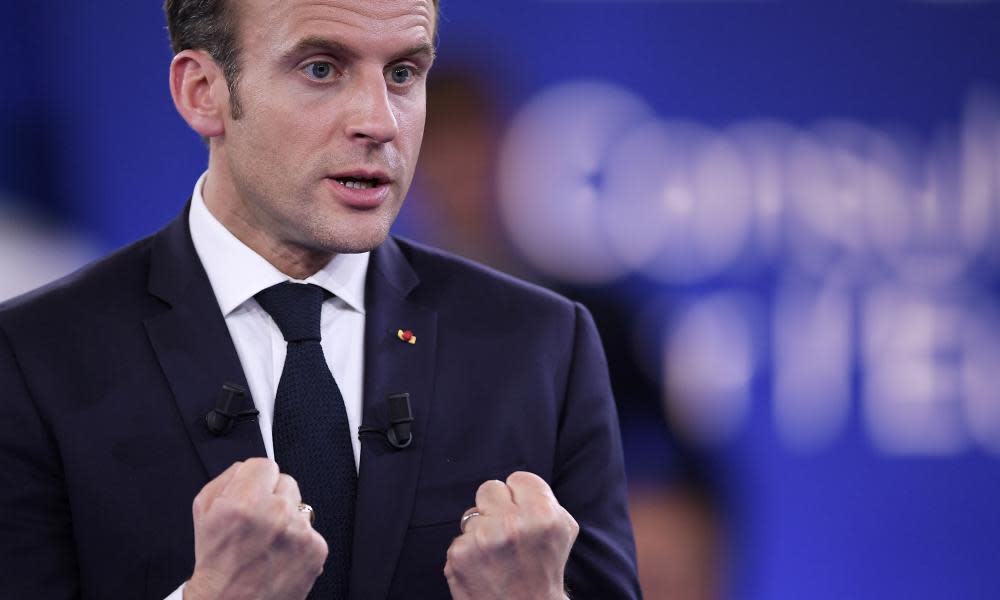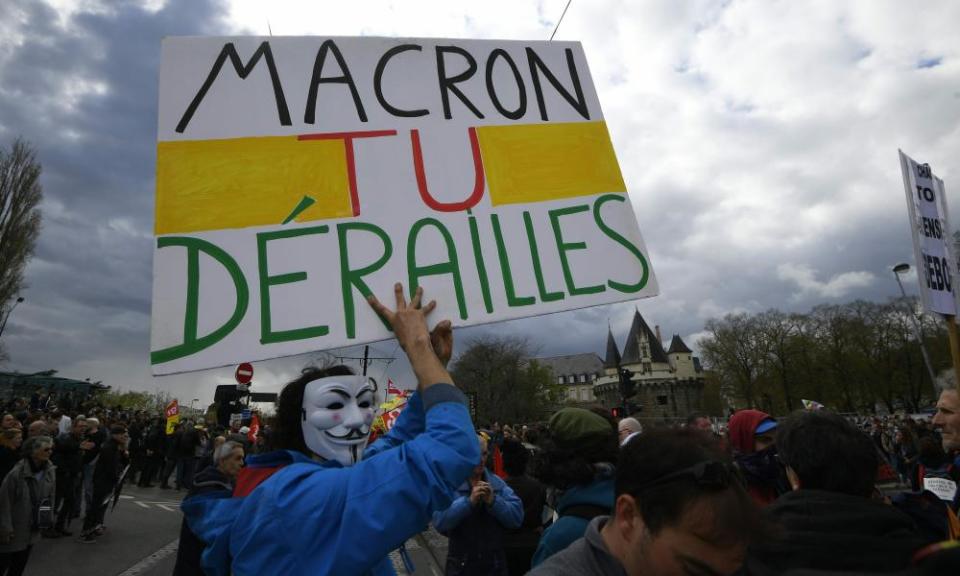Don’t be fooled by Emmanuel Macron the ‘moderate’

The world has gone mad, the fanatics of left and right are on the march, the voices of reason have been sidelined. This is the view of the self-styled “moderates” or “centrists” of the political world and the commentariat. There has been little reflection about how the broken economic model they defended unleashed so much anger and disillusionment.
Rather than debating ideas and policies, they longingly gaze after allegedly charismatic men who might act as saviours. David Miliband is the eternal prince over the water. But their international icon, France’s Emmanuel Macron, provides an instructive lesson in what “centrist” politics means in practice.
Macron is far more popular internationally than in France, where dissatisfaction with his presidency has surged to 58% less than a year after his election. Here is a man who owes his power to good luck rather than any vindication of his political philosophy. In the first round of the French presidential election, he scored less than a quarter of the vote, and not dramatically more than three other candidates including the far-right Marine Le Pen and radical left Jean-Luc Mélenchon. Macron’s thumping second-round victory was less an endorsement and more a rejection of fascism.
French scepticism towards Macron contrasts sharply with his own lack of self-doubt. He refused to be questioned by journalists because his “complex thought processes” were ill-suited for such a setting. His denunciations of his opponents would not be out of place on Donald Trump’s Twitter feed: they are “slackers” and “do-nothings”, while workers protesting over job losses should stop “wreaking havoc” and look for a job elsewhere. Macron is a pound-shop Margaret Thatcher, redistributing wealth to those with too much of it, while assaulting workers’ rights and France’s hard-won social model. His tax changes have gifted the hundred wealthiest households more than half a million euros a year: the top 1% captured 44% of his new tax breaks.

For the less affluent, it’s a different story. This former investment banker has slashed housing benefit, and hiked taxes on pensioners – in a country where the average monthly pension is just €1,300 (£1,100). His policies have shifted the workplace balance of power from workers to bosses. French students are staging occupations and protests against more selective entry requirements for universities, derided as an attack on free universal education and France’s social model.
Another pillar of his agenda is privatisation, including of France’s airports and part of the national energy utility. His confrontation with rail workers is seen as an attempt to lay the foundations for a catastrophic British-style privatisation of the railway industry. EU-mandated deregulation will mean foreign companies can soon compete with the state rail company SNCF, and Macron is transforming it from a state enterprise into a limited company; exactly what happened with the formerly state-owned France Télécom.
So-called centrists are supposed to be socially liberal. Macron exposes this pernicious myth for what it is. A man who courted left-leaning voters by promising a humane policy towards migrants and refugees now has them firmly in his sights. The number of days a person without papers can be imprisoned in a detention centre is to be doubled; the consideration time period for asylum has been halved, meaning fewer refugees will be accepted. Charities warn that refugees fleeing war will be deported. Macron’s interior minister, Gérard Collomb, claims that communities are “breaking up because they are overwhelmed by the inflow of asylum seekers”. No wonder the far-right Front National has described his policies as a “political victory”.
Macron offers no future for France, let alone any other western society. There is hope, however. For years after François Hollande betrayed his 2012 election pledge to break with austerity, the French left was in the doldrums. Polls showed that the far right was strongest among the disillusioned, insecure younger generation. The rise of radical left politician Mélenchon changed that: he won nearly a fifth of the vote in the first round of the presidential election, partly by prising some of the disaffected from the jaws of the far right.
Macron is presented as an oasis of moderation, a bulwark against the extremes. But there is nothing moderate about slashing taxes on the wealthy, attacking workers’ rights or demonising refugees. He represents a doubling down on an economic model that bred mass insecurity and proved an essential ingredient in the revival of French fascism.
It is the same across the west. An unjust economic model long defended by parties of the centre right and centre left – one that brought an economic crash that led to austerity and attacks on living standards – is squarely responsible for the polarisation of politics. If the left fails to provide an inspiring, coherent alternative, it will be the radical right that will triumph.
• Owen Jones is a Guardian columnist

 Yahoo News
Yahoo News 
